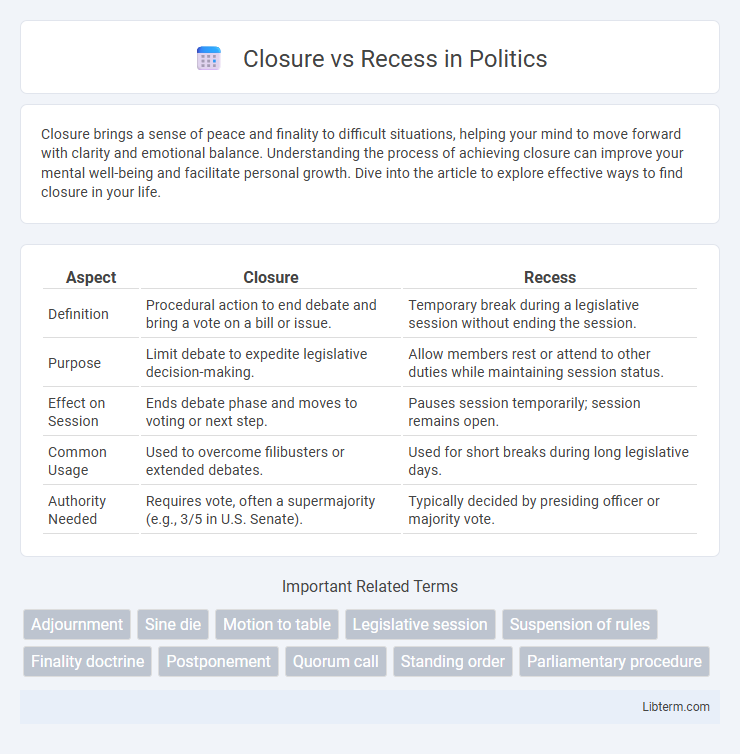Closure brings a sense of peace and finality to difficult situations, helping your mind to move forward with clarity and emotional balance. Understanding the process of achieving closure can improve your mental well-being and facilitate personal growth. Dive into the article to explore effective ways to find closure in your life.
Table of Comparison
| Aspect | Closure | Recess |
|---|---|---|
| Definition | Procedural action to end debate and bring a vote on a bill or issue. | Temporary break during a legislative session without ending the session. |
| Purpose | Limit debate to expedite legislative decision-making. | Allow members rest or attend to other duties while maintaining session status. |
| Effect on Session | Ends debate phase and moves to voting or next step. | Pauses session temporarily; session remains open. |
| Common Usage | Used to overcome filibusters or extended debates. | Used for short breaks during long legislative days. |
| Authority Needed | Requires vote, often a supermajority (e.g., 3/5 in U.S. Senate). | Typically decided by presiding officer or majority vote. |
Introduction to Closure vs Recess
Closure refers to the process of permanently ending a business, project, or operation, involving formal steps such as notifying stakeholders, settling debts, and legal dissolution. Recess, on the other hand, is a temporary pause or break in activity, often used in legislative bodies, academic institutions, or corporate settings to allow for rest or reorganization. Understanding the distinctions between closure and recess is essential for proper planning, resource allocation, and legal compliance.
Defining Closure in Various Contexts
Closure in various contexts refers to the formal ending or conclusion of a process, event, or structure, such as the legal closure of a case, the psychological closure after a traumatic event, or the physical closure of a business or facility. It signifies a definitive stopping point that resolves uncertainty, establishes finality, or facilitates transition to a new phase. Understanding closure involves recognizing its implications in emotional healing, operational cessation, or procedural completion across different domains.
Understanding Recess: Meaning and Uses
Recess refers to a temporary interruption or break in activities, commonly used in educational settings to provide students with rest and socialization time. Unlike closure, which signifies a complete and often permanent shutdown, recess allows for a pause before resuming normal operations. In workplaces, recess can also mean short breaks that improve productivity and focus.
Key Differences Between Closure and Recess
Closure refers to a permanent or long-term shutdown of a business or facility, resulting in the complete cessation of operations and termination of all activities. Recess denotes a temporary pause or break in operations, often used in contexts like legislative sessions, schools, or businesses, allowing activities to resume later. Key differences include duration, with closure being indefinite or final, whereas recess is short-term and reversible, and impact, where closure leads to permanent changes in organizational status, unlike recess which is intended to preserve continuity.
Purposes and Applications of Closure
Closure serves to temporarily or permanently end a process, event, or access point, ensuring safety, security, or completion of a task. It is commonly applied in infrastructure projects, event management, and legal or contractual agreements to prevent further activity or entry. Conversely, recess typically refers to a scheduled break or pause, allowing for rest or intermission without fully terminating the activity or process.
Common Scenarios for Implementing Recess
Recess is commonly implemented during school days to provide students with a structured break that promotes physical activity, social interaction, and mental refreshment, enhancing overall learning efficiency. It often occurs mid-morning or mid-afternoon, serving as a necessary pause in instructional time to reduce fatigue and improve concentration upon return to class. Unlike closures, which are full-day shutdowns impacting academic schedules, recess is a brief, intentional interval designed to support student well-being and foster classroom engagement.
Advantages of Closure Over Recess
Closure offers a complete and secure end to a process or period, ensuring all responsibilities and activities are conclusively addressed, while recess only provides a temporary pause without resolution. In legal and procedural contexts, closure prevents ambiguity and potential disputes by finalizing agreements or cases, unlike recess which maintains the status quo. Organizations benefit from closure as it allows for definitive transition and resource reallocation, whereas recess can prolong uncertainty and delay decision-making.
When to Choose Recess Instead of Closure
Recess is preferable over closure when temporary interruption is needed, such as for short-term maintenance, inspections, or minor repairs, allowing businesses to pause operations without permanent shutdown consequences. It minimizes operational disruptions and preserves workforce retention while maintaining the option to resume full activities quickly. Choosing recess supports flexibility in managing unforeseen circumstances or seasonal demand fluctuations without the costs associated with complete closure.
Impact on Outcomes: Closure vs Recess
Closure generally leads to more definitive outcomes by providing clear limits and finality, which can improve efficiency and focus in project completion. Recess, on the other hand, offers a temporary pause that allows for reflection, re-evaluation, and strategic adjustments, potentially enhancing long-term results through increased flexibility. The choice between closure and recess significantly impacts how objectives are achieved and can influence the overall success of organizational and legal processes.
Conclusion: Making the Right Choice
Choosing between closure and recess depends on specific circumstances such as project goals, budget constraints, and stakeholder impact. Closure offers a definitive end, ensuring all tasks are completed and documented, which benefits long-term accountability. Recess provides temporary relief or pause, allowing time for reassessment or resource reallocation while maintaining the potential for resumption.
Closure Infographic

 libterm.com
libterm.com